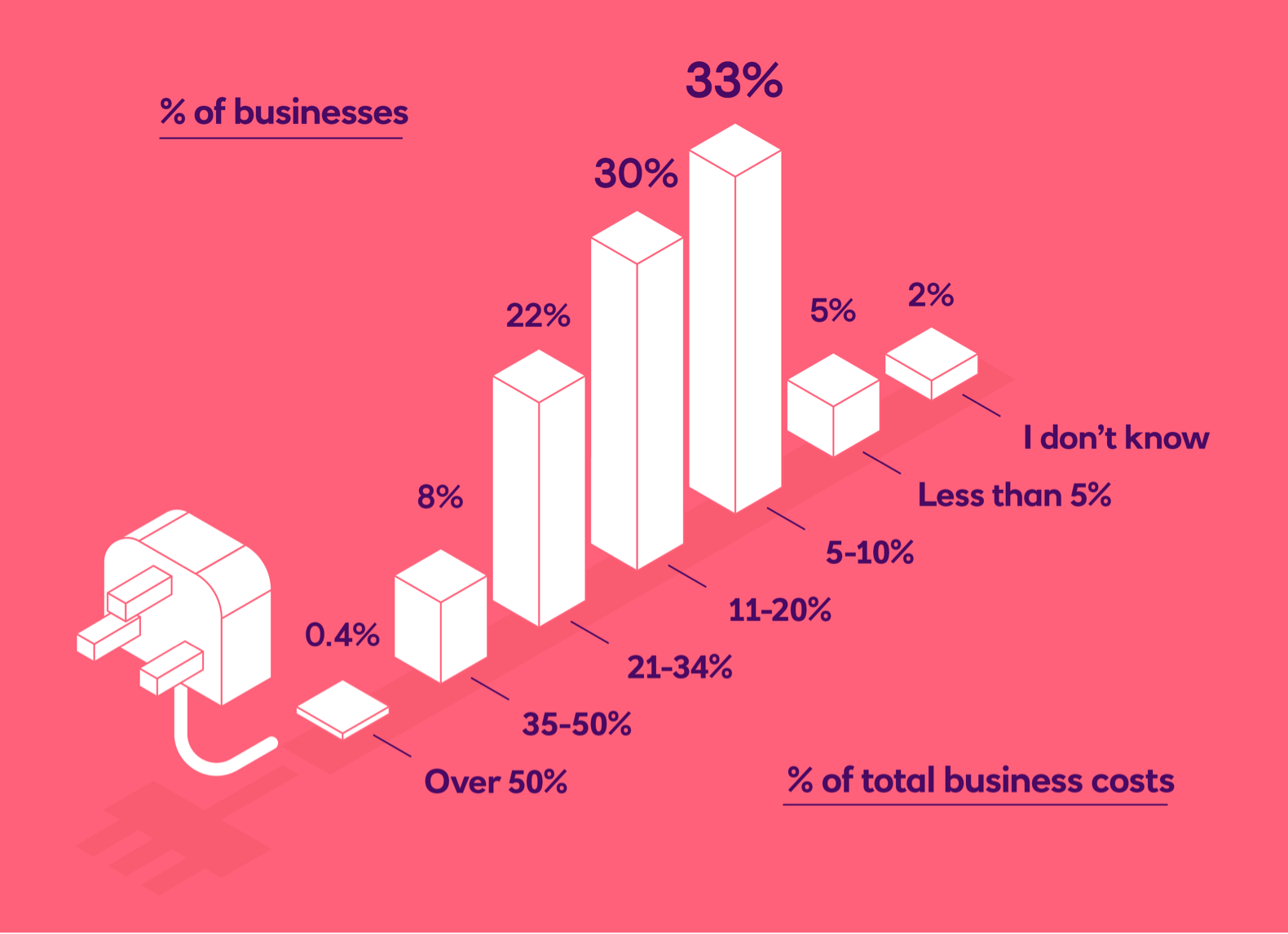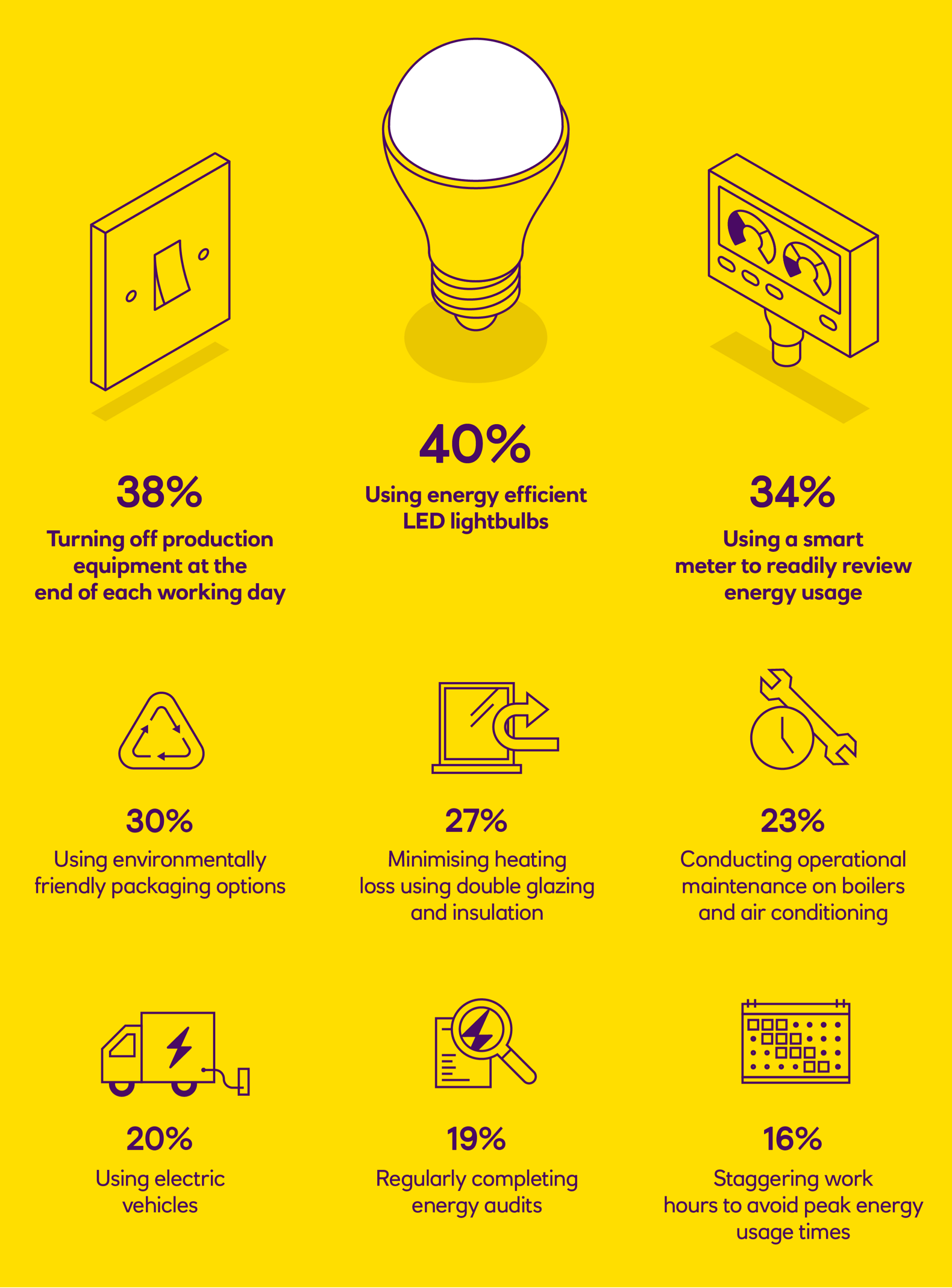Energy costs are mounting – as of September 2021, more than half (54%) of businesses spent £3,000 or more on annual energy bills, and this could rise even further.
No time to waste
How small businesses are getting savvy on energy savings
As business owners, there are plenty of costs that may keep us awake at night. Business rates. Rents. Running a payroll. But one financial headache that may often get overlooked is the cost of utilities. When was the last time you examined your energy bill in detail?
Tyl by NatWest commissioned a poll of 500 UK SME owners to find out more about their energy spending habits, and whether they’re investing in sustainable alternatives. At a time of record gas prices and the energy price cap rising, how are businesses leading the way in both saving themselves some money while being more friendly to the environment?
We discovered:
Yorkshire and the Humber businesses spend more than £5,000 per year on energy bills – the highest of any UK region.
70% of SME business owners believe that the cost of their energy bill impacts the growth of their business.
However, many businesses are leading an energy and cost-saving fightback. 72% of small business owners are currently taking action by adopting energy efficiency measures within the workplace.
Energy efficient LED lightbulbs are the efficiency measure most likely to be taken (according to 40% of businesses surveyed).
Bills, bills, bills
Most businesses (54%) spend at least £3,000 a year on energy bills, while almost a quarter (24%) spend over £4,000 annually.
A small number of businesses (2%) are coughing up more than £5,000 a year just on energy bills.
At the other end of the scale, a fraction (3%) of businesses pay less than £1,000 a year on their energy.
According to Statista figures from 2020, more than 3.2 million UK businesses operate from a physical premises, providing a hub of activity, a chance to interact with customers, and a home-away-from-home. But running an office, warehouse or store doesn’t come cheap. Each year, many businesses may be overspending on their utility bill without even knowing it – from heating and lighting their premises, to fuelling the humble tea or coffee break.
We asked UK business owners how much they’re spending on energy each year.
| Energy bill spend | % of businesses |
|---|---|
| £5,000+ | 1% |
| £4,000-5,000 | 22% |
| £3,000-3,999 | 30% |
| £2,000-2,999 | 21% |
| £1,000-1,999 | 20% |
| Less than £1,000 | 3% |
| I don't know | 3% |
Who’s spending the most on their annual energy business bill?
- Yorkshire and the Humber£5040
- North West£4987
- East of England£4728
- Greater London£3964
- West Midlands£3686
- North East£3333
- Wales£3264
- Northern Ireland£3166
- Scotland£3066
- East Midlands£2751
- South West£2592
- South East£2367
With more than half (54%) of businesses spending at least £3,000 annually on energy bills, the simple act of running a business with a physical ‘home’ often comes at an eye-watering cost.
And not all energy costs are distributed equally. We polled businesses across all regions of the UK to find out who’s spending the most on their energy bills.
What percentage of total business costs go towards energy consumption?

Of course, energy bills are by no means the only item of expenditure when it comes to running a business. Everything from business rates to broadband bills can blow a hole in a carefully planned budget. So where do energy costs rank in terms of the bigger picture?
Are energy costs holding businesses back?
A high number (70%) of small business owners believe that their company’s ability to grow has been impacted by energy bills.
Many small business owners (37%) are unaware of the support they’re entitled to from the government which could improve their energy efficiency.
69% of respondents aged 16-24 were aware of these government initiatives – the most of any age group surveyed.
So much to save, so little time
When you consider the investments that businesses can make – from hiring new staff to developing a web presence – are energy costs simply sapping our businesses’ potential?
Our survey found that 70% of SME owners believe that the cost of their energy bill impacts the growth of their business. This sentiment was most apparent in the East Midlands, where 78% of respondents agreed that their energy bills are holding their business back.
But aside from factors beyond our control like global gas prices, why are businesses spending so much on their energy bills? Our survey uncovered some unexpected findings.
It’s true, saving money on energy bills (while helping to save the environment) can take money, time and know-how. But could more be done to make business owners aware of the savings they could be making?
- 38% The percentage of SMEs that are unaware of the government support they’re entitled to – from environmental tax relief to capital allowances for energy efficient equipment.
- 31% The percentage of businesses polled who said they don’t have enough time to dedicate to enforcing more sustainable measures.
- 31% The percentage of respondents who said they don’t have enough information regarding any sustainable measures they could take.
- 24% The percentage of business owners who said they were not in a financial position to consider any additional energy saving measures
- 17% The percentage of businesses surveyed who said they don’t fully understand their energy bill.
Bright ideas
A large majority (72%) of business owners we polled are already carrying out energy efficiency measures.
LED lightbulbs are the most popular energy efficiency initiative – cited by 40% of respondents.
Businesses are saving money – almost a fifth (19%) are saving between £2,000 and £3,000 a year through energy efficiency measures.
The good news is that saving money and saving the planet may not be mutually exclusive. From energy efficient vehicles to LED lights, UK businesses are having a lightbulb moment. While sustainability measures sometimes sound pricey on paper, many businesses are framing it in another way – ‘can we afford not to go green?’
According to UK government figures for 2020, business and industry accounted for 18.2% of UK greenhouse gas emissions. But far from being the villain of the piece, businesses can drive the charge towards lower emissions (while lowering their energy costs) and help the UK on its journey towards ‘net zero’. UK government figures¹ show there are 16.6 million people employed in the UK SME sector – almost a quarter of the total population² – so every energy-saving act can make a massive impact on our wallets and the world.
In fact, 72% of business owners told us they’re currently taking action with energy efficiency measures. Below are just some of the ways that businesses are making a difference to their premises, with knock-on benefits for the environment. Not sure how to take action? See if any of these ideas inspire you and your team to go a little bit greener.
Tips for making your business more energy efficient
Energy efficiency measures taken by SMEs

By taking these energy-saving measures, many businesses are already counting the extra pennies they’ve saved while doing their bit for the planet. If you’re looking for some bright ideas, upgrading from conventional lighting like halogen bulbs to LED bulbs could deliver cost savings of up to 80%³ (compared to incandescent bulbs) for your business. What’s more, according to a Department of Energy & Climate Change report⁴, using figures from the Carbon Trust, up to 30% of heating costs can be saved by preventing cold air entering a building, such as sealing draughty doors, or encouraging staff to turn down the thermostat rather than opening windows. The report also notes that businesses that use compressed air – such as dentists – can lose nearly £700 a year if there is a 3mm hole in their pipework or other compressor; therefore, fixing any air leaks could save you money.
Just how much are businesses saving by improving their sustainability measures? Here’s what these energy-saving entrepreneurs told us.
| Annual saving | % of businesses |
|---|---|
| £500-999 | 39% |
| £1,000-1,999 | 35% |
| £2,000-3,000 | 19% |
| Less than £500, please specify | 5% |
| N/A; I do not save any money by adopting these measures | 1% |
| Over £3,000, please specify | 0.3% |
“I find that now, more than ever, shoppers are thinking carefully about where their goods come from, and the journey they’ve taken to get there,” says Keli. “Businesses that react to this – and adjust their supply chains and environmental practices accordingly – are the ones who are going to win among this new cohort of eco-conscious consumers.”
There are countless examples of where businesses have responded to customers’ environmental awareness, and saved money in the process. For example, zero waste store The Little Green Pantry started life as a pop-up market stall with support from the NatWest Back her Business fund. Owner Keli King saw an opportunity to address growing concern about plastic consumption, and despite the challenges presented by the COVID-19 pandemic, was able to adapt and sell plastic-free household essentials.
Methodology
Tyl by NatWest commissioned a survey of 500 SME Business Owners to find out how much small businesses are paying out per year on utility bills, as well as how many SME’s are making changes to create a more sustainable work environment.
We have used existing data to understand the impact energy saving initiatives can have on businesses and have provided references to the relevant sources throughout.
Fair use
Think your readers might like to hear about this research? Feel free to share the information on your website and please credit with a link back to this page so they can see the research in its entirety.
Still have some questions? We’re ready to help
How much could you save?
If you fancy getting a bit more bang for your buck, get a no-obligation quote from us and see if you could save on your current rates.
Help and support
Our FAQs provide some useful tips and how-to videos to help you with your account and card machines.
Get in touch
Give us a call or chat to us online. We’re open Monday to Saturday
8am to midnight and Sunday 9am to 5pm (bank holidays may vary).